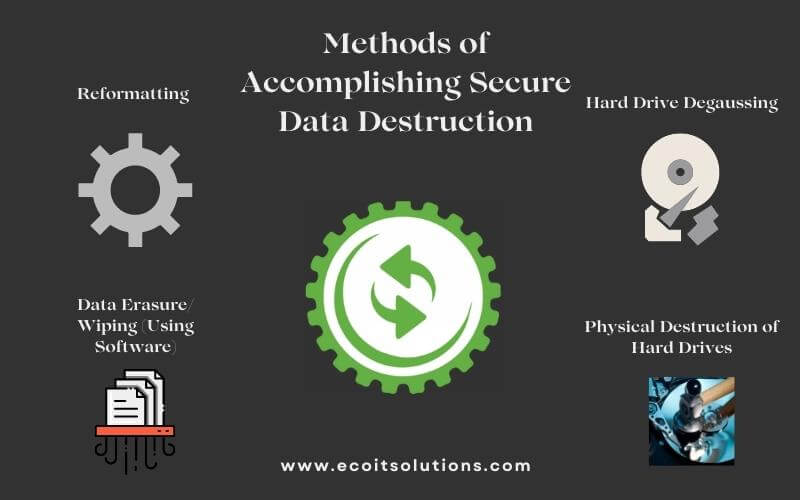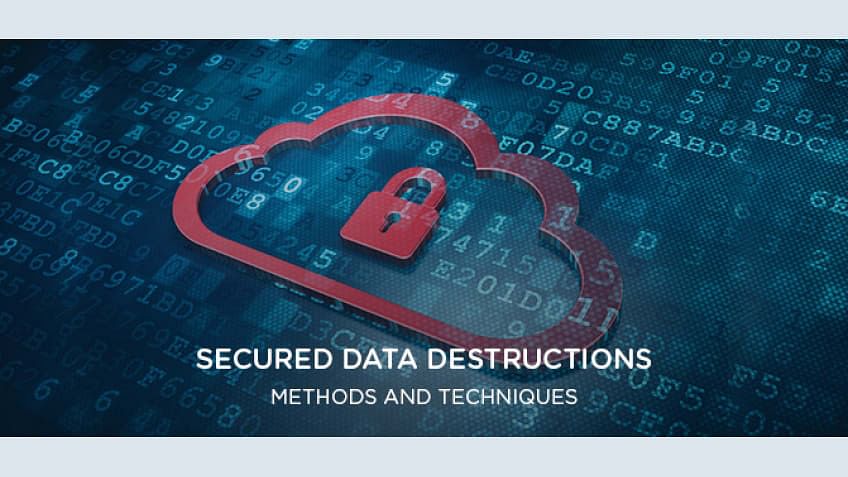Why Data Destruction is a Vital Element of Comprehensive Cyber Security
Why Data Destruction is a Vital Element of Comprehensive Cyber Security
Blog Article
The Necessary Nature of Information Destruction in Upholding Computer Security Services and Protecting Against Unauthorized Gain Access To
In a period where data breaches and identification theft are increasingly prevalent, the relevance of effective data devastation can not be overstated. Various techniques, from data cleaning to physical damage, serve as critical safeguards against unauthorized access.
Relevance of Information Damage
In a progressively digital world, the value of data damage can not be overemphasized. As organizations generate substantial amounts of sensitive info, the potential consequences of stopping working to effectively take care of and get rid of of that data end up being progressively severe. Data violations, identity theft, and corporate espionage posture considerable threats, emphasizing the need of reliable information devastation methods.

Additionally, as modern technology progresses, so as well do the techniques whereby destructive actors seek to manipulate delicate details. Organizations should remain attentive and proactive in their information devastation methods to protect against these advancing risks. By focusing on information destruction, business not only shield their assets however likewise foster trust fund among stakeholders and clients, demonstrating a dedication to accountable information administration and safety methods.
Techniques of Effective Information Devastation
To guarantee the full and permanent devastation of sensitive data, organizations can employ a selection of effective techniques tailored to their certain requirements. One of the most typical approaches is information wiping, which includes making use of specialized software to overwrite existing information multiple times, making recovery basically difficult. This is specifically useful for solid-state drives and hard drives, where conventional removal techniques are insufficient.
One more effective technique is degaussing, which uses strong electromagnetic fields to interrupt the magnetic domain names on storage space media, making the information irretrievable. This approach is particularly suited for magnetic storage devices, such as tape drives and difficult disks.
Physical damage is also a feasible option, entailing the shredding, squashing, or incineration of storage tools. This method guarantees that information can not be recouped, making it perfect for companies managing extremely sensitive info.

Compliance With Data Defense Laws
Organizations should not just concentrate on reliable information devastation methods yet likewise make sure conformity with data security policies that govern exactly how sensitive info is taken care of and dealt with. Sticking to these laws is important for guarding individual information and keeping client trust. Rules such as the General Data Protection Policy (GDPR) in the European Union and the Medical Insurance Transportability and Accountability Act (HIPAA) in the United States impose rigorous guidelines on data management, that include requirements for the safe disposal of delicate info.
To accomplish conformity, companies have to apply comprehensive data damage plans that line up with these lawful structures. This includes recognizing information that requires damage, developing protocols for safe methodsâEUR" such as shredding physical media or utilizing software that meets sector requirements for data wipingâEUR" and maintaining in-depth records of devastation tasks. Normal audits ought to be performed to make sure adherence to these policies and to identify any kind of possible areas for renovation.
Failing to follow data security guidelines can lead to substantial legal ramifications, consisting of substantial fines and damages to a company's track record. Integrating compliance right into information damage techniques is not only a legal commitment however also an essential part of a durable info safety technique.
Effects of Poor Data Handling
Poor data handling can result in serious consequences that expand beyond prompt functional obstacles. Organizations might face significant economic losses because of data violations, which commonly lead to pricey removal efforts, lawful charges, and regulative penalties. These monetary effects can prevent and strain resources growth, inevitably influencing a company's profits.
In addition, inadequate information handling can seriously damage an organization's reputation. Customers, companions, and stakeholders might shed rely on an entity that falls short to shield delicate details, bring about lowered client loyalty and potential loss of organization opportunities. This erosion of trust can take years to reconstruct, if it can be recovered whatsoever.
In addition, companies can encounter legal implications occurring from non-compliance with information protection try this laws. Such offenses might lead to charges and examinations, compounding the economic concern and additional tainting the company's photo.
In the realm of cybersecurity, inadequate data management techniques can create vulnerabilities that make systems extra at risk to unapproved access and cyberattacks. Ultimately, these consequences emphasize the critical relevance of carrying out robust data handling treatments to guard delicate info and maintain business stability.
Finest Practices for Secure Data Disposal


First of all, information should be classified according to its level of sensitivity. Delicate info calls for a lot more rigorous disposal approaches, such as shredding physical documents and utilizing innovative software for digital data wiping. Employing certified information damage solutions ensures compliance with market laws and criteria.
Secondly, organizations must execute an information disposal policy that mandates normal audits. This policy must outline the treatments for information retention and devastation, guaranteeing that obsolete data is disposed of immediately and securely. Educating workers on these procedures is important to promoting a society of security awareness.
Last but not least, maintaining thorough records of disposed information boosts accountability and gives a clear audit path. This documents needs to consist of the type of data damaged, the method utilized, and the date of disposal.
Final Thought
Finally, the important of effective information devastation appears in its function in improving computer security services and alleviating unapproved access risks. Taking on durable approaches such as data cleaning, degaussing, and physical damage, together with compliance with regulations like GDPR and HIPAA, is important for protecting sensitive information. Disregarding proper information disposal methods can bring about extreme consequences, including data violations and legal consequences. Implementing ideal methods in protected data disposal inevitably fortifies organizational integrity and customer trust fund.
In a period where data breaches and identity additional reading theft are progressively prevalent, the relevance of efficient information damage can not be overstated. data destruction. Data breaches, identification theft, and corporate espionage position substantial hazards, underscoring the necessity of efficient data devastation practices
Compliance with guidelines such as GDPR and HIPAA requireds that organizations execute rigorous information defense steps, consisting of the safe devastation of data at the end of its lifecycle.
By prioritizing data damage, business not only secure their possessions however additionally foster trust amongst stakeholders and customers, demonstrating a dedication to liable data management and safety techniques.
Organizations should not just concentrate on reliable data destruction approaches but additionally make certain conformity with information defense laws click for more info that govern just how sensitive info is dealt with and disposed of.
Report this page